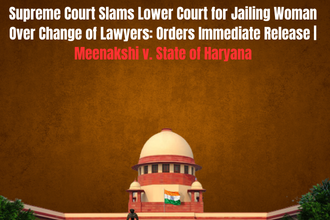In a significant ruling reinforcing the sanctity of investigative procedures and judicial discipline, the Hon’ble Supreme Court of India has held that High Courts must not order a transfer of investigation to the Central Bureau of Investigation (CBI) in a routine manner or solely based on unsubstantiated or vague allegations. The judgment was delivered on April 11, 2025, in the case of Vinay Aggarwal v. The State of Haryana & Ors. [2025 LiveLaw (SC) 417].
This landmark decision, rendered by a division bench comprising Justices Sudhanshu Dhulia and K. Vinod Chandran, reaffirms the precedent laid down by the Constitution Bench in State of West Bengal v. Committee for Protection of Democratic Rights [(2010) 3 SCC 571], emphasizing that the extraordinary power to transfer investigations to the CBI should only be exercised in exceptional circumstances.
Case Background
The case arose from an FIR registered against the appellant, Vinay Aggarwal, for impersonating an Intelligence Bureau (IB) officer and allegedly extorting ₹1.49 crore from the complainant (Respondent No. 3). During the course of investigation, the complainant filed an application seeking transfer of the case to the CBI, alleging that the appellant was colluding with local police authorities in Haryana and that the investigation was biased.
The Punjab and Haryana High Court, accepting this contention, transferred the investigation to the CBI, despite the fact that a Special Investigation Team (SIT) led by the Assistant Commissioner of Police (ACP) was already handling the matter.
Supreme Court’s Observations
Setting aside the High Court’s order, the Supreme Court underscored that courts must refrain from ordering CBI probes casually, particularly when no credible material is presented to doubt the competence or impartiality of the local investigating agency.
The apex court noted that:
“The High Courts should direct CBI investigation only in cases where material prima facie discloses something calling for an investigation by the CBI and it should not be done in a routine manner or on the basis of vague allegations.”
The Court further stressed that:
- Mere bald or speculative allegations of police incompetence or bias are insufficient grounds to transfer the case.
- No evidence was provided to show that the SIT was conducting an unfair investigation.
- The complainant failed to substantiate the allegation that the appellant had influence over local police officials.
The bench reiterated that procedural caution is critical when invoking the court’s power to transfer an investigation to an external agency like the CBI. The threshold for such a transfer must be high to ensure that local investigative mechanisms are not undermined without just cause.
Precedent Relied Upon: Committee for Protection of Democratic Rights (2010)
The Court relied heavily on the principles laid down in the Constitution Bench judgment in State of W.B. v. Committee for Protection of Democratic Rights, where it was held that:
- The power to direct a CBI inquiry under Article 226 must be exercised sparingly.
- Such orders are permissible only where exceptional circumstances exist—such as where the case has national or international implications, or there is a clear and substantial breach of fundamental rights.
- Vague suspicions or public interest arguments without supporting evidence are not enough to trigger this power.
This case continues to serve as the foundational precedent for determining the appropriateness of transferring investigations to the CBI.
Supreme Court’s Reasoning in Vinay Aggarwal’s Case
Justice Dhulia, authoring the judgment, explained that while the High Court believed a CBI probe would serve the ends of justice, it failed to assess whether sufficient justification existed for bypassing the ongoing SIT investigation.
The Court noted:
“After going through the records of the case, we are of the view that the present case is not one where a CBI investigation ought to have been directed by the High Court.”
The Supreme Court found that:
- The SIT was functioning under a senior officer.
- The complainant’s apprehensions were speculative.
- No procedural lapses or delays by the police were evidenced.
Hence, the appeal was allowed, and the High Court’s order was set aside.
Impact of the Judgment
This ruling has several far-reaching implications:
- Prevents Misuse of Judicial Discretion:
Courts are now firmly reminded to avoid casually entertaining pleas for CBI investigations unless backed by solid evidence of partiality, misconduct, or exceptional public interest. - Strengthens Local Policing Systems:
By refusing unwarranted transfers to the CBI, the judiciary sends a clear message that local police mechanisms are presumed to be competent unless proven otherwise. - Restores Balance Between Investigative Agencies:
The judgment acts as a check against overburdening the CBI with routine cases that fall well within the jurisdiction and capacity of state police agencies. - Protects Against Judicial Overreach:
This ruling helps maintain the delicate balance of power between the judiciary and investigative wings of the executive.
Key Takeaways for Legal Practitioners
- Evidence matters: Vague or emotional arguments won’t cut it when seeking extraordinary remedies like transfer of investigation to CBI.
- Use precedents wisely: Practitioners must be equipped with relevant Supreme Court rulings—particularly Committee for Protection of Democratic Rights (2010)—to argue such petitions effectively.
- Procedural vigilance: Always assess whether alternative remedies or internal review mechanisms (like approaching higher police authorities or courts for supervisory orders) have been exhausted.
Conclusion
The Supreme Court’s verdict in Vinay Aggarwal v. State of Haryana & Ors. fortifies the judicial principles governing transfer of investigations and reinstates public trust in due process. By reiterating that CBI inquiries should not be ordered on a whim or without adequate material evidence, the Court ensures that judicial activism does not overshadow investigative autonomy.
In a justice system often stretched thin between judicial review and executive accountability, this ruling brings welcome clarity—and balance.


